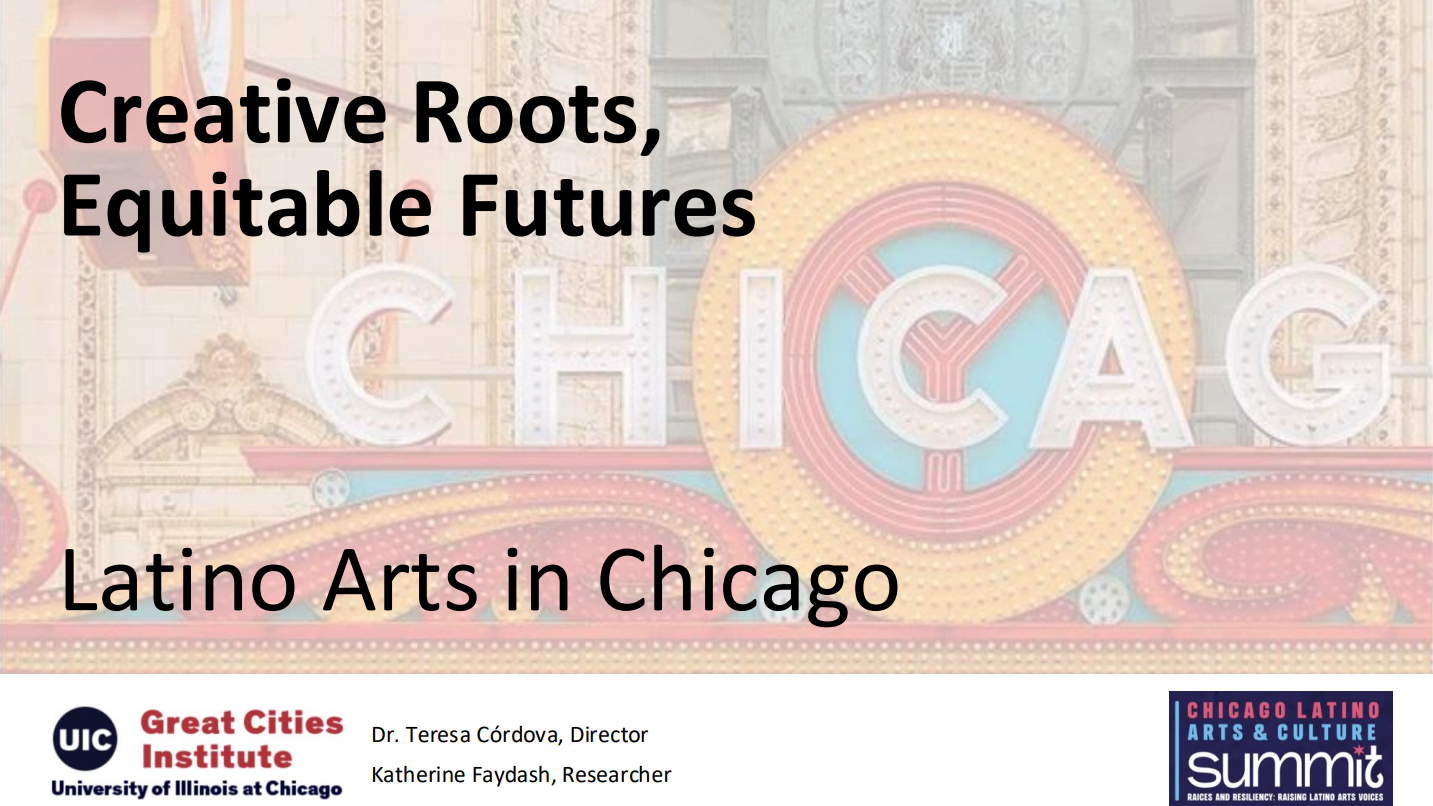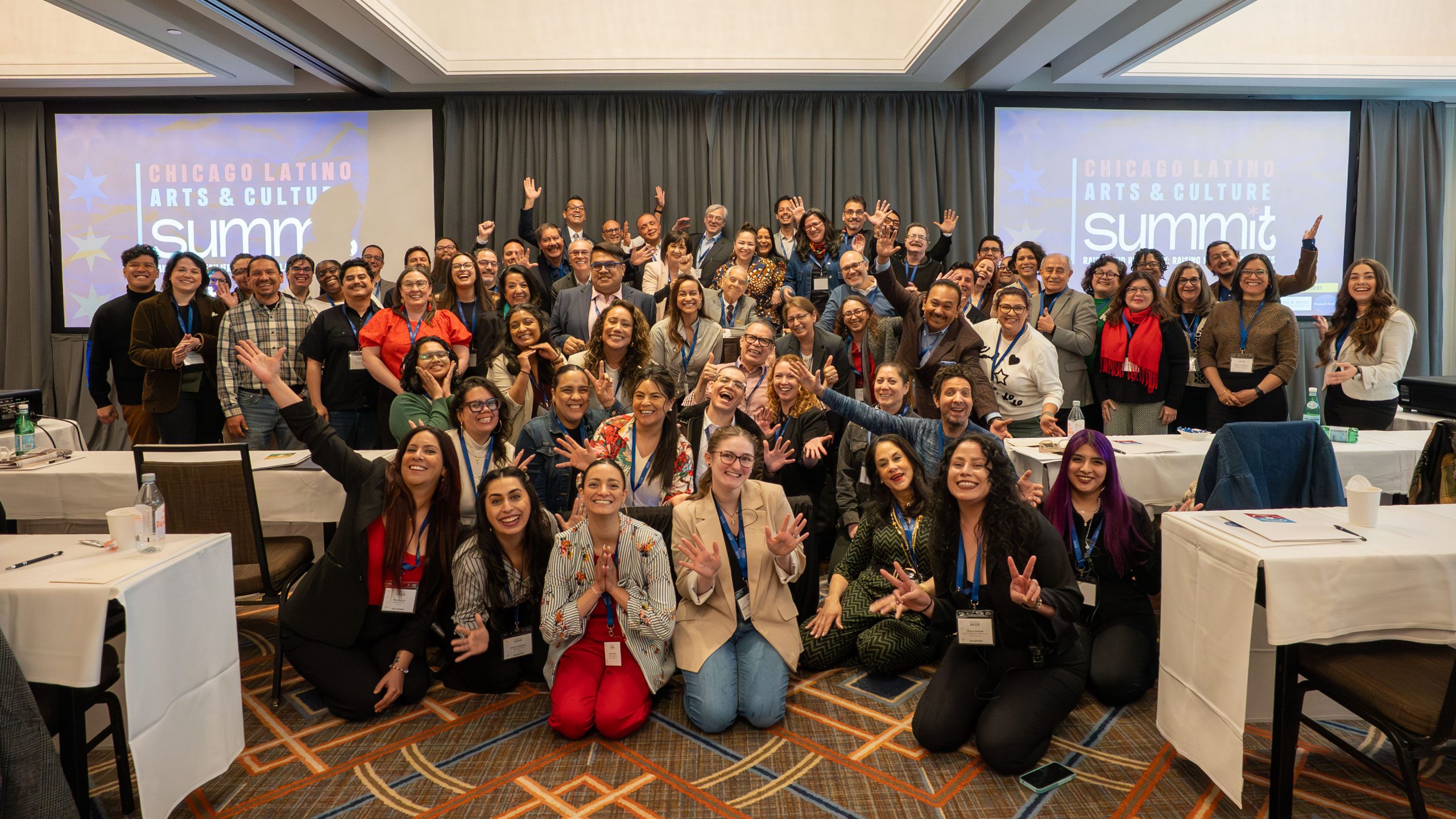Executive Summary:
Creative Roots, Equitable Futures: Latino Arts in Chicago presents a data-informed analysis of the cultural and economic contributions of Latino arts organizations in Chicago, while also exposing the ongoing inequities in how these organizations are funded and represented. Latino communities make up nearly 30 percent of the city’s population and support a dynamic ecosystem of more than 300 organizations engaged in theater, music, dance, visual arts, film, and multidisciplinary work. These organizations are essential to Chicago’s cultural identity, yet they receive disproportionately low levels of public and philanthropic support.
This report applies a mixed-methods approach to provide a comprehensive picture of the Latino arts landscape. To analyze funding, it draws on data from the Foundation Directory, NEA GrantSearch, and DCASE public records. To assess economic impact, the study uses IMPLAN modeling and ESRI Spending Potential data, along with demographic and economic data from the U.S. Census and Economic Census. To explore issues of visibility and access, the report incorporates media coverage, award systems, and publicly available institutional documents.
Between 2020 and 2022, Latino arts organizations received between 4.2 percent and 6.6 percent of philanthropic arts funding in Chicago, with 5.4 percent in 2022. In total, 56 organizations received 655 grants totaling $21.9 million, the majority of which were small and designated for general operating support. Public arts funding showed similar disparities. NEA grants to Latino organizations typically ranged from $10,000 to $20,000, and were often awarded to larger institutions rather than community-based groups.
Despite these gaps, Latino arts play a vital role in the local economy. Arts and culture contribute $36 billion to Illinois’s economy and support over 216,000 jobs. In Chicago, the arts sector generates $1.72 billion in economic activity and provides 11,000 jobs. Latino arts organizations, from grassroots initiatives to major institutions, contribute significantly through employment, neighborhood activation, cultural tourism, and youth programming. Each dollar invested in the arts yields approximately $1.30 in economic return.
Latino artists and organizations continue to face systemic barriers, including limited access to funding networks, performance space, and leadership roles within grantmaking institutions. Media visibility and award recognition also remain low. However, emerging coalitions, advocacy efforts, and new equity-focused initiatives have begun to shift the landscape toward greater inclusion.
This report calls for sustained and proportionate investment in Latino arts. Supporting this sector is not only an act of cultural equity but a strategic investment in the economic and civic life of Chicago.
Below is a photo from the 2025 Chicago Latino Arts & Culture Summit (CLACS), where findings from the Creative Roots, Equitable Futures report were shared during the opening session on Latino arts, equity, and Chicago’s cultural landscape. Katherine Faydash and Dr. Teresa Córdova led the discussion, offering data-driven insights into the contributions of Latino arts organizations, funding disparities, and strategies for advancing equity across the city’s arts ecosystem. Their presentation helped set the tone for a day centered on resilience, advocacy, and creative leadership.
Acknowledgments:
This report was commissioned by the Chicago Latino Arts & Culture Network (CLACN), whose leadership, partnership, and long-standing commitment to cultural equity made this research possible. The core questions that shaped this analysis emerged directly from CLACN’s advocacy and vision—specifically from the desire to better understand the scope, impact, and structural challenges facing Latino arts organizations in Chicago. We are especially grateful for CLACN’s trust and intellectual partnership throughout this process. Special thanks to Jorge Valdivia, for his partnership, clarity of vision, and collaboration in the development of this report. The authors gratefully acknowledge the John D. and Catherine T. MacArthur Foundation for its generous support of this work. Their investment reflects a meaningful commitment to advancing equity and visibility for culturally rooted organizations across the city.
This report was researched and developed by Katherine Faydash, with the support of colleagues at the UIC Great Cities Institute. Special thanks to Dr. Teresa Córdova, Thea Crum, and Matt Wilson for their guidance, research collaboration, and insight at every stage of development. We also extend our appreciation to the many artists, organizers, and cultural workers whose leadership continues to shape a more vibrant, just, and inclusive arts landscape in Chicago.
Author:
Katherine Faydash
Editor and Urban Planner
Read and Download the Full Report Here.
Download the PowerPoint Presentation Here.




